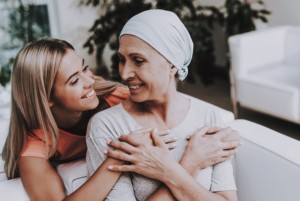
LIVING WITH BREAST CANCER
QUALITY OF LIFE
Given that breast cancer can have far-reaching physical and psychological impacts, maintaining a positive quality of life – at the time of diagnosis, during treatment and after completion of treatment – is a crucial aspect of treatment outcomes and breast cancer care.
Physical and psychological impacts of breast cancer
Despite improved treatment and survival rates, breast cancer can still have extreme physical and psychological impacts on patients. Physical side effects from cancer treatments are extensive and vary depending on the treatment approach. Side-effects may include pain, nausea, fatigue (tiredness), mouth ulcers, lymphoedema (swelling in the arm or breast after surgery), hair loss, infertility, red/dry skin, and insomnia.
Psychologically, patients may experience anxiety, shock and depression following a breast cancer diagnosis, and during the course of its treatment. Other issues include body image and intimacy concerns, career-related concerns and fear of cancer recurrence. For young women, they may also have survival concerns for those with young children or concerns about pregnancy or fertility.
Charities for Breast Cancer support
There are a variety of support services that provide people and their loved ones with assistance in coping with a cancer diagnosis or recovery following cancer. Cancer Council and Breast Cancer Network Australia have further resources to provide emotional and practical support for people affected by cancer; Cancer Australia also has further information on managing the physical and emotional changes following cancer, and finding support for those impacted by cancer.
